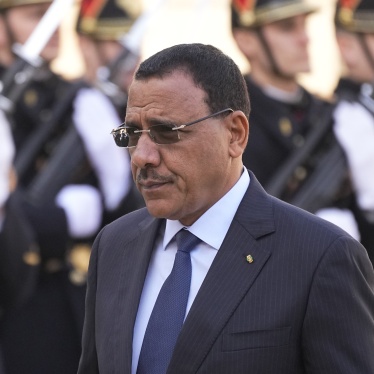(New York) - The election today of more than 200,000 judges in Rwanda offers hope of speeding up trials resulting from the 1994 genocide, Human Rights Watch said today. But the innovative judicial system, called “gacaca,” may be subject to political pressures and lacks some basic internationally recognized safeguards, such as the right to legal counsel.
"The system has flaws, but it provides the only real hope for trials in the foreseeable future for more than 100,000 persons now detained in inhumane conditions,” said Alison Des Forges, Senior Adviser to the African Division of Human Rights Watch.
Human Rights Watch urged the Rwandan government to rapidly complete the legislative and logistical steps needed to make the “gacaca” system operational, including a law on indemnization of victims.
In the first step towards creating a complex three-tiered system, Rwandans will elect panels of nineteen judges for each of some 11,000 jurisdictions. The judges are to be chosen by acclamation as “persons of integrity.” They are not required to have any knowledge of the law and will undergo brief but intensive training before beginning their unpaid service.
“The new jurisdictions are likely to reflect local political dynamics,” said Des Forges. “Sometimes they will judge well, sometimes they will favor victims or the accused.”
If there are miscarriages of justice, neither party can call on legal counsel for help. Rwandan authorities assert that permitting parties to have access to legal counsel would distort a “popular” form of justice.
“Gacaca is not a purely popular form of justice,” said Des Forges. “The state has its role, with prosecutors preparing cases and giving advice to the judges, so the accused too should have the right to seek legal advice to defend himself.”
Human Rights Watch called for intensive and sustained monitoring of the new system given the inherently political nature of the jurisdictions and the absence of the right to counsel for both victims and the accused.
Background on Rwandan Judicial System
Genocide trials have taken place in regular Rwandan courts since the end of 1996, but only 5,300 persons have been judged, fewer than 5 percent of those currently detained. Lack of personnel and resources as well as political considerations and corruption have hampered this system.
Long subject to international criticism for the slow delivery of justice and the inhumane conditions of detention, the Rwandan government faces other pressures to speed up trials. The issue of justice may figure importantly in political debate as the government moves towards national elections promised for 2003. Feeding the detainees is a major expense thus far shared with the international community, but foreign donors have indicated that the Rwandan government will have to assume an increasing share of this burden in the near future.
To deal with the huge backlog of cases, the government is establishing a new system that takes its name, gacaca, and its inspiration from a pre-colonial community-based system for resolving conflicts. But in contrast to the older system, this modern gacaca represents a hierarchical, state-directed initiative.
Gacaca offers the hope of faster trials because so many more jurisdictions will be operating simultaneously throughout the country. But the new jurisdictions are unlikely to speed up the judicial process as much as is expected. Training the more than 200,000 judges and equipping jurisdictions with even minimal materials for record-keeping will likely require at least six months before the jurisdictions can begin to operate. The judges will work from case summaries prepared by the local prosecutor's office but the number of prosecutors has not kept pace with the growing number of jurisdictions. As a result, the productivity of the prosecutors will limit the speed of gacaca trials as it often has limited the speed of trials in regular courts.
The Rwandan genocide law provides for reduced sentences for those who confess their crimes fully and name all their fellow criminals. Some 16,000 persons have confessed but many of them have not yet had their declarations reviewed and approved by the prosecutor's office, a necessary step for the confessions to take effect. Although confessions will shorten the time needed for trials, investigations into the accuracy of the statements constitute yet another demand on the time of overburdened prosecutorial staff.
The most local jurisdiction, which of the cell, is to assign the accused to one of four categories according to the gravity of the crime he is alleged to have committed. Those placed in category one, the most serious, may not benefit from the confession procedure to obtain a reduction of sentence; they must be tried in regular courts rather than gacaca proceedings; and they alone may be sentenced to death if found guilty. Although the accused can appeal trial judgments, they are not allowed to appeal their assignment into a given category.
An informal system of gacaca has been carried out in Rwandan prisons and lockups since 1999 at the order of the Minister of Justice. Not regulated by any uniform procedure, these sessions have been carried out in different ways in different prisons at different times. Results of these sessions have been entered into the case files of the accused but it is unclear what if any control has been exercised over the material thus gathered in order to verify its accuracy. In several cases reported to Human Rights Watch, accused persons alleged that gacaca sessions in the prisons reached blatantly false conclusions in response to pressure from authorities.
Rwandans have already begun asking government officials whether gacaca jurisdictions will also treat accusations of serious crimes committed by soldiers of the government army in 1994 and after. Authorities have replied that such cases can only be treated in the regular court system, a response which has generated discontent among some who would like to see those accused of these crimes also brought before popular justice.







